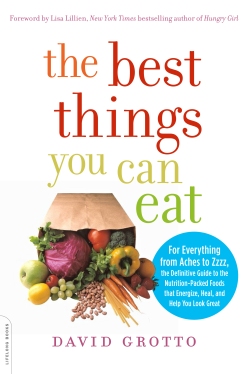As featured in January 3rd’s edition of WebMD’s Real Nutrition
By David Grotto, RD, LDN
Do you have a bunch of “don’t eats” in your resolution package this year? I sure hope not — how depressing! Nothing sets you on the course to Failuresville like stating “I won’t ever eat that”. Forget about it. And why would you forego anything unless there was a good sound reason to do so? Besides, “adding in” healthy food is so much more enjoyable and beneficial to your health than “giving up” supposed bad foods, and it’s more likely to be a sustainable behavior that you can live with.
However, are the bad really bad? I picked five “picked on” foods that I thought were worthy of keeping in your diet just in case you were thinking of excluding them this year. I thought I’d set the record straight on what the latest science has to say about them.
 photo courtesy of www.beef.org
photo courtesy of www.beef.org
1. Beef. Heart disease continues to be the number one killer of both men and women in this country and controlling cholesterol levels is thought to be the most effective way of reducing the risk of heart disease. Meat is usually the first diet element to get the old “heave-ho” when it comes to cholesterol management. However, a study that appeared this month in the American Journal of Clinical Nutrition showed that including lean beef, such as sirloin, in a heart-healthy diet was as effective for lowering cholesterol as traditional heart-healthy diets.
In this study, two heart-healthy diets, such as the DASH (Dietary Approaches to Stop Hypertension) diet, that contained up to 1 ounce of beef per day and a modified DASH diet containing upwards of 5.4 ounces of beef per day (renamed BOLD for Beef in a Optimal lean Diet) were randomly assigned to participants. All diets were equally effective in reducing LDL cholesterol (about a 10% reduction). “What’s so unique about this study is that though all of the diets provided less than 7% saturated fat, this was the first time that lean beef was included and found to be as effective for lowering LDL cholesterol,” says distinguished professor Penny Kris-Etherton, PhD, RD from Penn State University. “The take home message is that lean beef can be included in a heart healthy diet and, best yet, there are twenty-nine cuts of beef that fall into the ‘lean’ category.” You can find those lean cuts listed at www.beefnutrition.org.
pho to courtesy of www.nuthealth.org
to courtesy of www.nuthealth.org
2. Roasted nuts. I’ve always heard that roasting nuts kills off many of their nutrients and health benefits. Many of my raw foodie buds think you have to soak nuts too in order to make them more digestible and to release their inner nutrients. But a recent study conducted by Joseph Vinson, PhD from the University of Scranton found little nutritional difference between raw and roasted nuts. He found that the polyphenol (plant antioxidant) content were virtually the same. Myth busted! But don’t forget, most roasted nuts are salted. If you must eat them salted, try to stay within the recommended amount of 1 ounce a day, which typically provides less than 200 mg of sodium.
3. Chocolate. Something that tastes so good can’t possibly be good for you, so it’s easy to assign blame to chocolate for a whole host of health woes. However, a review of several short-term studies (meta-analysis) conducted by researchers from Harvard revealed that those participants who regularly consumed flavanol (plant antioxidant) -rich cocoa had significantly improved blood pressure, cholesterol levels and blood flow and also reduced insulin resistance. Most health experts suggest about an ounce a day for good health. Remember — it’s the cocoa in chocolate that’s the healthy ingredient NOT the added calories and saturated fat found in confections made with cocoa. Bottom line? Enjoy in chocolate confections in moderation.
 photo courtesy of wikipedia.org
photo courtesy of wikipedia.org
4. Whole Eggs. Like beef, eggs have been relegated to the hall of shame for foods associated with heart disease. However, research spanning some 40 years has not made the connection between egg consumption and heart disease. Though eggs are high in cholesterol, what’s different about them compared to other cholesterol-containing foods is that egg yolks contain powerful antioxidants that may help protect LDL cholesterol from becoming oxidized and turning into a more harmful form associated with heart disease. Regardless if whether the theory holds water or not, most agree that one whole egg a day, which supplies about 185mg of cholesterol, fits well within the heart-healthy guidelines of 300mg of cholesterol a day. Let me be the first to egg you on!
 photo courtesy of likecool.com
photo courtesy of likecool.com
5. Coffee. Next to alcohol, no other beverage has been blamed more for causing health problems ranging from cancer and heart disease to reflux disease (chronic heartburn) and dehydration. And to be clear, I’m referring to straight up coffee without all of the fixin’s here. Lots of added cream and sugar can change this healthy beverage into liquid candy. Yes, that’s right, I said healthy.
Back in 2005, coffee was found to be the number one source of antioxidants in the American diet, finally establishing that coffee wasn’t just caffeinated fluid anymore. In fact, several studies have correlated coffee drinking with health benefits such as reduced or no increased risk of colon, prostate, breast and endometrial cancers. The research on diabetes has been mixed depending on whether your cup of Joe has caffeine or not. Some research has suggested that coffee drinkers may be at lower risk for developing Alzheimer’s disease and senile dementia when compared to those who don’t drink coffee. A recent Australian study was unable to find any correlation between coffee consumption and gastroesophageal reflux disease even though coffee always appears on the top of the list of “no-nos” for chronic heartburn sufferers. Regarding dehydration, up to two cups (16 ounces) of coffee a day was found to be as hydrating as water. After that the diuretic effects of caffeine may kick in for some and increase your need for additional fluids.
Worry not citizen. Including these supposed “bad boys” in your healthy New Years diet seems to fit just fine. Now you’re only problem is to come up with something else to give up in their place. How about giving up “giving up”?
Need to know the low down on the health worthiness of a food? Hit me up in the comment section. I’m ready to take on your dietary demons. Happy New Year!





